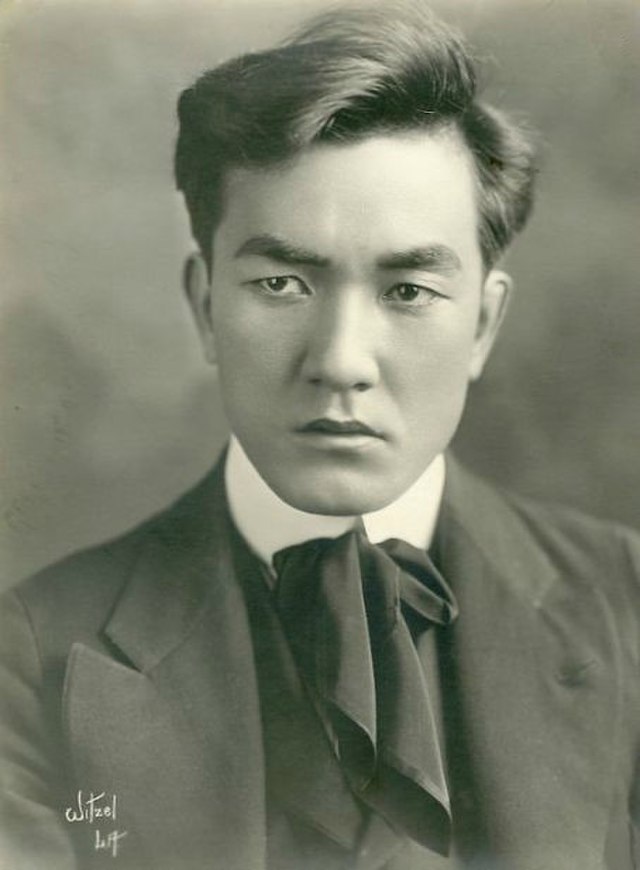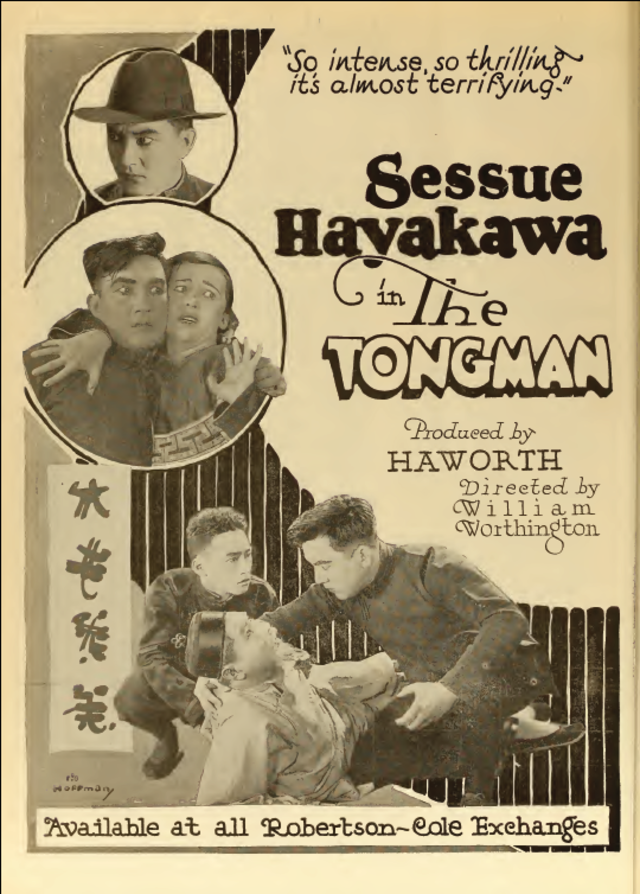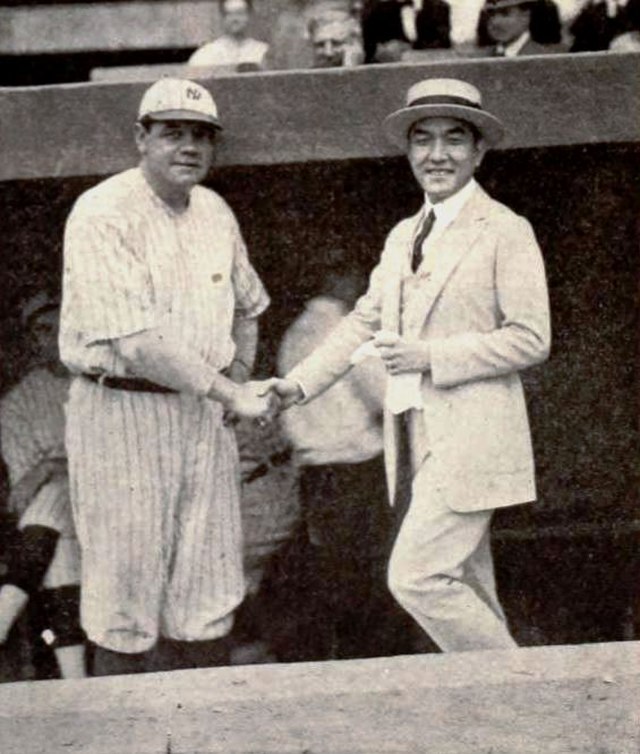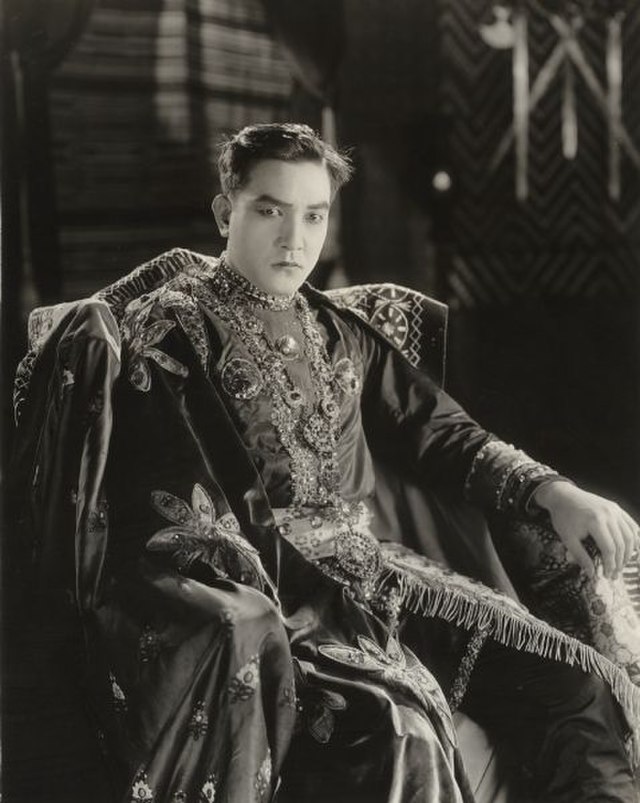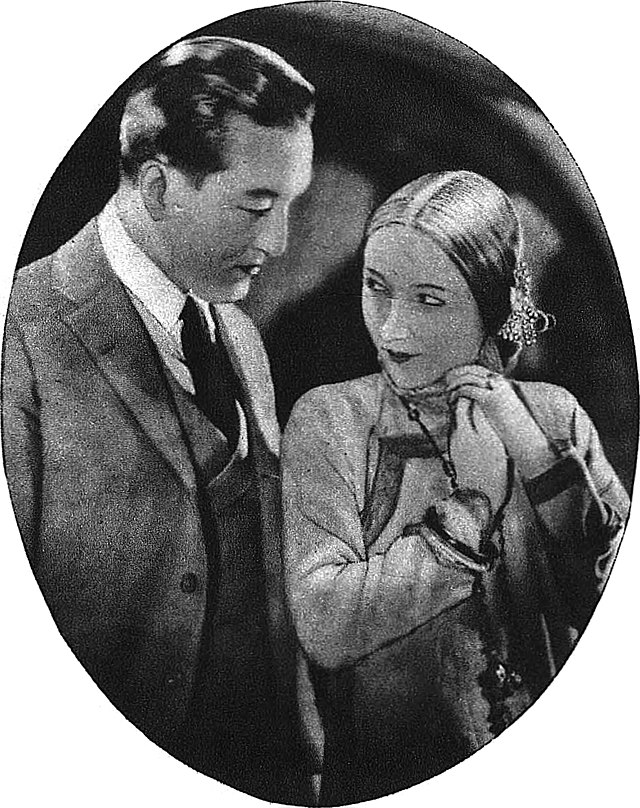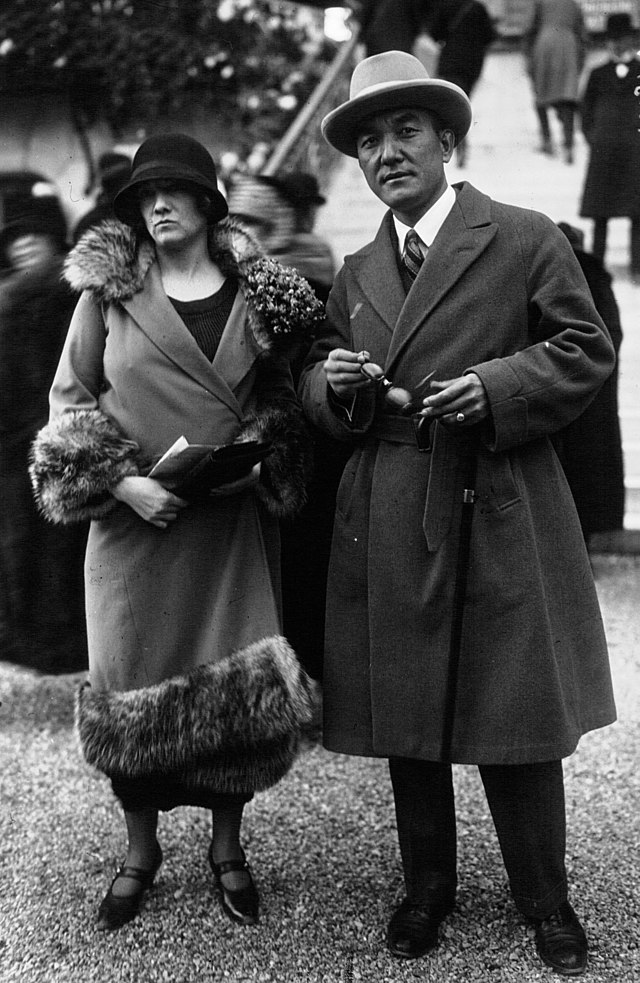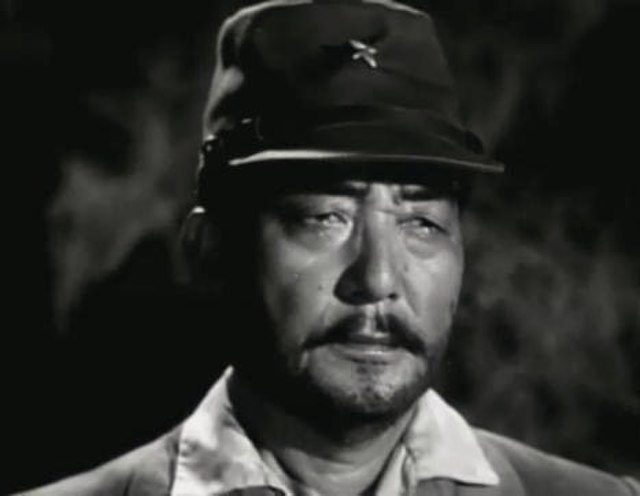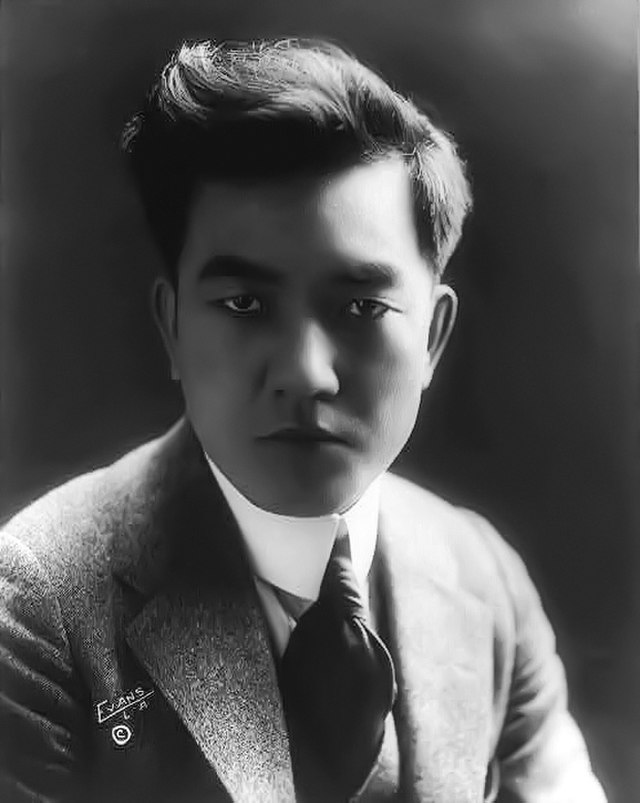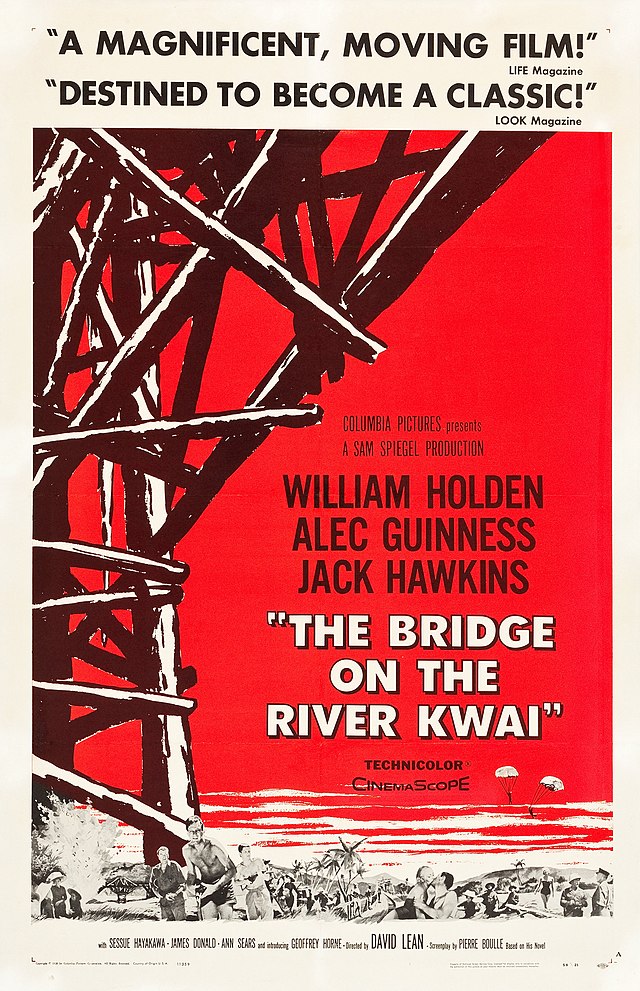Sessue Hayakawa
back| Full Name | Kintarō Hayakawa (早川 金太郎) |
| Stage Name | Sessue Hayakawa (早川 雪洲) |
| Born | June 10, 1889 |
| Birthplace | Minamibōsō, Chiba Prefecture, Japan |
| Died | November 23, 1973 |
| Buried | The family grave in Chiba Prefecture, Japan |
| Married to | Tsuru Aoki (married in 1914 until her death in 1961) |
| Children | Yoshiko Hayakawa (adopted daughter) - Zenjiro |
| Notable films | The Cheat (1915) - The Dragon Painter (1919) - The Bridge on the River Kwai (1957) - House of Bamboo (1955) - Hell to Eternity (1960) |
Sessue Hayakawa
The First Asian Superstar of Hollywood
Sessue Hayakawa (1889-1973) was a pioneering Japanese actor who became one of Hollywood's first major Asian stars during the silent film era.
Born in Japan, he moved to the U.S. and quickly rose to fame with his breakout role in The Cheat (1915). Known for his subtle, expressive acting style, Hayakawa challenged racial stereotypes, portraying complex, dignified characters.
He founded his own production company, Haworth Pictures, producing films like The Dragon Painter (1919). Despite facing racism and the challenges of talkies, he made a powerful comeback with The Bridge on the River Kwai (1957), earning an Academy Award nomination.
Related
Sessue Hayakawa (1889 – 1973)
Biography and Movie Career Overview
Sessue Hayakawa was born as Kintarō Hayakawa on June 10, 1889, in Minamibōsō, Chiba Prefecture, Japan. He was born into a prominent and affluent family, which afforded him a good education. His father was a chief of a county police station. Hayakawa was originally intended to join the Japanese naval academy and pursue a career in the Japanese Imperial Navy, but a ruptured eardrum at age 17 prevented him from doing so. This incident led him to consider taking his own life, as he felt his honor and family expectations were compromised.
Hayakawa then studied political economics at the University of Chicago in the United States. However, his life took a turn when he discovered his passion for acting while watching a performance in Los Angeles.
Career Beginnings
Hayakawa's acting career began almost accidentally. He was encouraged to pursue acting by Thomas H. Ince, a film producer, and director who was impressed by Hayakawa’s presence and demeanor. Hayakawa started appearing in silent films and quickly gained fame for his portrayal of exotic, often romanticized characters. His breakthrough role was in The Cheat (1915), directed by Cecil B. DeMille, where he played a wealthy Japanese ivory dealer. His intense performance made him one of the first Asian actors to gain a significant following in the United States.
Rise to Stardom
Following the success of The Cheat, Hayakawa became one of the highest-paid actors in Hollywood, earning up to $5,000 a week, a huge sum at the time. He was often cast in romantic roles, which was unusual for an Asian actor in that era. His success led to the formation of his own production company, Haworth Pictures Corporation, which produced several films that featured him in lead roles, including The Dragon Painter (1919), one of his most famous silent films.
Challenges and Later Career
Despite his early success, Hayakawa faced challenges due to the prevalent racism in Hollywood. The rise of anti-Japanese sentiment during World War I and later World War II also affected his career. By the mid-1920s, with the advent of talkies, his roles began to diminish, and he eventually returned to Japan and France to continue his acting career in both theater and film.
During the 1940s, Hayakawa made a comeback in Hollywood, most notably with his role as Colonel Saito in The Bridge on the River Kwai (1957). This role earned him critical acclaim and a nomination for the Academy Award for Best Supporting Actor, as well as a Golden Globe nomination.
Personal Life
Sessue Hayakawa married Tsuru Aoki, a Japanese-American actress, in 1914. Aoki was also a prominent actress and appeared in many of Hayakawa’s films. They remained married until her death in 1961. The couple adopted a daughter, Yoshiko, and had two biological children, Zenjiro "Henry" Hayakawa and Fujiko Hayakawa.
Later Years and Death
After his wife’s death, Hayakawa became a Zen Buddhist priest in 1961, dedicating his time to spiritual pursuits. He retired from acting in the late 1960s and spent his remaining years in Japan.
Sessue Hayakawa passed away on November 23, 1973, at the age of 84 due to a cerebral thrombosis. He was laid to rest in the family grave in Chiba Prefecture, Japan.
Legacy
Sessue Hayakawa remains a pioneering figure in film history, remembered as one of the first Asian actors to break into Hollywood and achieve international stardom. His performances challenged stereotypes and opened doors for future generations of Asian actors. His contribution to the world of cinema, both in the silent era and beyond, has left an indelible mark on the industry.
Who is Sessue Hayakawa:
Pioneering Acting Style of Sessue Hayakawa
Sessue Hayakawa's acting style was both unique and pioneering, especially considering the context of his career during the silent film era and beyond. His approach to acting was marked by a blend of intensity, subtlety, and physical expressiveness, making him stand out in a time when exaggerated gestures and overt expressions were the norm.
Key Elements of Sessue Hayakawa's Acting Style
- Subtlety and Restraint: Hayakawa’s performances were characterized by an understated and controlled approach, which contrasted sharply with the more flamboyant acting styles prevalent during the silent film era. He often conveyed deep emotion through minimalistic gestures and facial expressions, allowing him to express complex emotions without the need for melodramatic flourishes. This subtlety made his characters appear more realistic and relatable, drawing the audience in with a sense of quiet intensity.
- Expressive Eyes: One of the most striking features of Hayakawa’s performances was his use of his eyes to convey emotion. In the absence of spoken dialogue, his eyes became a powerful tool, communicating everything from anger and sorrow to love and longing. His ability to convey a wide range of emotions through a single glance or slight change in expression was one of his defining characteristics and a key reason for his success in silent films.
- Physical Presence and Poise: Hayakawa possessed a commanding physical presence, often portraying characters with an air of dignity and control. His movements were deliberate and graceful, contributing to the overall aura of authority and power that many of his roles required. Whether he was playing a noble prince, a menacing villain, or a conflicted hero, his posture and bearing lent a sense of gravitas to his characters.
- Emotional Depth: Despite the cultural barriers and stereotypes he often faced, Hayakawa infused his characters with emotional depth and complexity. He avoided playing into simplistic or one-dimensional portrayals, instead bringing a nuanced understanding of human emotion to his roles. This depth allowed him to portray characters who were often conflicted, torn between duty and desire, honor and love, or tradition and change.
- Cultural Sensitivity and Authenticity: Hayakawa was careful to portray his characters with cultural authenticity, especially in a Hollywood landscape that frequently relied on stereotypes and caricatures. He took pride in presenting a more accurate and respectful representation of Asian characters, often pushing back against scripts that he felt were demeaning or inaccurate. This commitment to cultural sensitivity was reflected in his performances, where he imbued his characters with dignity and integrity.
- Mastery of Silent Film Techniques: As a silent film star, Hayakawa mastered the art of non-verbal communication. His understanding of the medium allowed him to use his body language, facial expressions, and even stillness to great effect. He was able to create moments of tension, romance, or introspection simply through his presence on screen, demonstrating a deep understanding of how to engage the audience without words.
- Versatility: Although Hayakawa was often cast in similar types of roles—such as exotic romantic leads, noble heroes, or menacing villains—he brought a unique interpretation to each character. His versatility was evident in his ability to move seamlessly between different genres, from drama and romance to action and thriller, all while maintaining his distinct style.
Impact on Film and Legacy
Hayakawa's acting style was revolutionary, particularly in breaking away from the exaggerated expressions and over-the-top gestures that were common in silent films. His emphasis on subtlety and emotional truth influenced not only his contemporaries but also the generations of actors that followed. His performances paved the way for a more nuanced and sophisticated approach to acting, particularly in how actors from non-Western backgrounds could portray complex characters without relying on cultural clichés.
Furthermore, his style helped to elevate the portrayal of Asian characters in film, setting a standard for dignity and depth that contrasted sharply with the often simplistic and dehumanizing representations common in early Hollywood. His legacy is seen in the many actors of diverse backgrounds who have followed in his footsteps, striving for authenticity and depth in their performances.
In summary, Sessue Hayakawa's acting style was defined by its subtlety, emotional depth, and physical expressiveness. His ability to convey complex emotions with restraint and authenticity made him a standout performer in both silent films and talkies, leaving a lasting impact on the craft of acting and on the portrayal of Asian characters in cinema.
Notable Personal Quotes:
· On his approach to acting:
"I want to portray the soul of the East. We have our own moral and spiritual codes, and I wish to show them through my work."
· On breaking stereotypes in Hollywood:
"I cannot afford to be just another actor. I want to set a high standard for Asian actors and to be a pioneer in portraying us as human beings, with all the complexities that entails."
· On his role in The Bridge on the River Kwai:
"I didn’t want to play Colonel Saito as just another villain. I wanted to show his humanity, his struggles, and his conflict between duty and compassion."
· Reflecting on his Hollywood career:
"Hollywood is like a kamikaze mission. One must be prepared for the unexpected. But for all the challenges, I found my place and my identity through my work."
· On his cultural heritage and its impact on his career:
"Being Japanese gave me a unique perspective, but it also meant I had to work twice as hard to prove my worth in an industry that wasn’t always welcoming."
· On the challenges of being an Asian actor in early 20th century Hollywood:
"The roles offered to me were often limited and stereotypical, but I always tried to find the dignity in the character, to rise above the stereotype."
· On his artistic vision:
"I see acting not just as a profession but as an art, a way to bridge cultures and convey the universal emotions that connect us all."
· On his legacy:
"I hope that my work has helped to open doors for other Asian actors, to show that we too can be stars and tell our stories with grace and depth."
Awards and Recognition:
Sessue Hayakawa, as one of the first major Asian actors in Hollywood, received a variety of awards and recognition throughout his career. Though the formalized award systems, such as the Academy Awards, were less inclusive during much of his career, Hayakawa's work was nonetheless celebrated both in his time and posthumously. Here's an overview of the awards and recognitions he received:
- Academy Award Nomination:
Best Supporting Actor for The Bridge on the River Kwai (1957): Hayakawa was nominated for an Academy Award for Best Supporting Actor for his role as Colonel Saito in The Bridge on the River Kwai. This role is widely regarded as one of his most significant, and the nomination was a landmark moment, recognizing his exceptional talent in a film that became an international success.
- Golden Globe Nomination:
Best Supporting Actor for The Bridge on the River Kwai (1957): In addition to his Oscar nomination, Hayakawa was also nominated for a Golden Globe Award for Best Supporting Actor for the same role. His portrayal of Colonel Saito was celebrated for its complexity and depth, contributing to the film's critical acclaim.
- Star on the Hollywood Walk of Fame:
- Sessue Hayakawa was honored with a star on the Hollywood Walk of Fame, located at 1645 Vine Street. This recognition solidified his status as a significant figure in the history of American cinema. The star honors his contributions to both the silent film era and the sound film era.
Cultural Impact: Although not an official award, Hayakawa's influence on film history and his pioneering role as one of the first major Asian stars in Hollywood have been recognized posthumously in various retrospectives, film festivals, and academic studies. His legacy continues to be celebrated as a trailblazer for Asian actors in the Western film industry.
- Legacy and Cultural Recognition:
Over the years, various film festivals and cultural institutions have paid tribute to Sessue Hayakawa's work, highlighting his contributions to cinema through screenings, retrospectives, and discussions. His films, particularly The Dragon Painter and The Bridge on the River Kwai, are often featured in these events as examples of his enduring talent.
- Influence on Future Generations:
Hayakawa's success in a racially segregated industry paved the way for future generations of Asian and Asian-American actors. His influence is recognized in studies of film history and discussions on diversity in Hollywood, where he is often cited as a trailblazer who broke barriers in the early 20th century.
- Recognition in Japan:
In his native Japan, Hayakawa is celebrated as a cultural icon who achieved international fame. Various Japanese publications, documentaries, and academic studies have explored his life and career, honoring his contributions to both Japanese and global cinema.
Movies with Sessue Hayakawa
1914
The Typhoon
Synopsis: Sessue Hayakawa plays a Japanese man who becomes embroiled in a tragic love affair with a French woman, leading to a dramatic and devastating conclusion.
The Wrath of the Gods
Synopsis: A love story set against a backdrop of religious conflict, where Hayakawa's character is torn between his love for a Western woman and the expectations of his traditional family.
1915
The Cheat
Synopsis: Hayakawa plays a wealthy Japanese ivory dealer who lends money to a society woman in return for a brand on her shoulder. This controversial film was pivotal in his rise to fame.
The Clue
Synopsis: A drama in which Hayakawa portrays a mysterious Eastern man who helps solve a complex murder case, revealing hidden cultural tensions.
1916
Alien Souls
Synopsis: Hayakawa is featured as a Japanese prince who falls in love with an American woman, challenging both societal norms and racial prejudices.
The Honorable Friend
Synopsis: Hayakawa stars as a noble Japanese man navigating the complexities of love and honor when he falls for an American woman.
The Soul of Kura San
Synopsis: This film explores cultural misunderstandings and personal honor as Hayakawa's character attempts to maintain his dignity while dealing with prejudice.
1917
Hashimura Togo
Synopsis: A light-hearted comedy in which Hayakawa plays a Japanese servant trying to adapt to life in America, dealing with both humorous and serious situations.
Each to His Kind
Synopsis: A romance between a Japanese man and a British woman, highlighting the challenges they face from their respective societies.
1918
The Secret Game
Synopsis: A World War I espionage thriller where Hayakawa plays a Japanese-American double agent, caught between loyalty to his heritage and his adopted country.
The White Man’s Law
Synopsis: Hayakawa plays an Asian leader who becomes embroiled in a conflict with Western colonizers, raising questions about justice and power.
1919
The Dragon Painter
Synopsis: A beautiful love story about a reclusive artist, played by Hayakawa, who believes his fiancée is the reincarnation of a lost princess. The film is a meditation on love, art, and inspiration.
The Tong Man
Synopsis: Hayakawa stars as a member of a Chinese-American gang, embroiled in a violent struggle for power in San Francisco’s Chinatown.
1920
An Arabian Knight
Synopsis: Set in the Middle East, Hayakawa plays an Arab chieftain who must navigate a treacherous political landscape while pursuing his love for a foreign woman.
The Devil's Claim
Synopsis: In this tale of seduction and betrayal, Hayakawa portrays a novelist who becomes entangled in a plot of mysticism and deceit.
1921
Black Roses
Synopsis: Hayakawa plays a Japanese artist who falls in love with a Russian ballerina, leading to tragic consequences amidst cultural clashes.
The Swamp
Synopsis: A drama where Hayakawa's character, a Japanese fisherman, faces challenges of prejudice and survival in a hostile environment.
1924
The Great Prince Shan
Synopsis: Hayakawa plays an Asian prince who becomes involved in a complex web of political intrigue and romance with a Western diplomat.
1926
The King of Chinatown
Synopsis: Hayakawa is featured as a Chinatown leader who struggles to maintain order and justice in his community, amidst external threats.
1931
Daughter of the Dragon
Synopsis: A crime thriller where Hayakawa stars as an honorable Chinese detective working to dismantle an opium smuggling ring in London’s Chinatown.
1937
The Cheat (Remake)
Synopsis: A sound remake of his 1915 film, where Hayakawa reprises his role, this time in the era of talkies, revisiting the themes of power, seduction, and race.
1950
Three Came Home
Synopsis: Hayakawa portrays a Japanese officer during World War II, involved in the internment of Western civilians, showcasing both his ruthlessness and humanity.
1955
House of Bamboo
Synopsis: Hayakawa plays an honorable Japanese police inspector working with an American agent to bring down a criminal gang in post-war Tokyo.
1957
The Bridge on the River Kwai
Synopsis: Hayakawa’s most famous role as Colonel Saito, the stern but conflicted Japanese commandant of a POW camp during World War II. His portrayal earned him an Academy Award nomination.
1960
Hell to Eternity
Synopsis: In this war drama, Hayakawa plays a Japanese official in the Pacific theater, focusing on the human side of the conflict and the complexities of cross-cultural relationships.
1962
The Big Wave
Synopsis: A film adaptation of Pearl S. Buck’s novel, where Hayakawa plays a wise fisherman in a Japanese village facing the threat of a tsunami.
1966
The Daydreamer
Synopsis: A live-action/animated hybrid film in which Hayakawa provides the voice for the Emperor in a whimsical adaptation of Hans Christian Andersen’s tales.
1967
The Seventh Dawn
Synopsis: Set in post-World War II Malaya, Hayakawa plays a Chinese warlord involved in the country’s struggle for independence.

